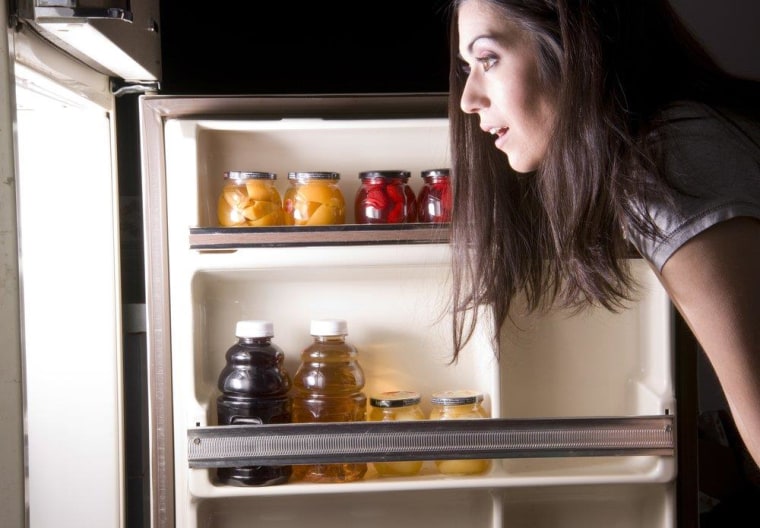People who don’t get enough sleep may pack on the pounds because they’ve got the munchies — the same munchies that pot smokers say they get, researchers said Monday.

An experiment aimed at explaining why people overeat after a poor night’s sleep suggests that food becomes much more appealing, and that the brain’s own marijuana-like chemicals are responsible.
“We know that when people use marijuana, they overeat. And they tend to eat things that are yummy and rewarding,” said Erin Hanlon, a research associate in endocrinology at the University of Chicago who helped lead the study.
Hanlon, working as part of a team that’s been studying sleep and eating habits, looked at a brain chemical called endocannabinoid 2-arachidonoylglycerol (2-AG for short). It resembles the same chemicals found in cannabis, but it's made in the brain and affects pain, pleasure and appetite.
Junk food is harder to resist
When volunteers were deprived of sleep, their levels of 2-AG stayed higher, for longer, and they also snacked on unhealthier foods, Hanlon’s team reported in the journal Sleep.
“When you activate the cannabinoid system you are exciting the reward system,” Hanlon told NBC News.
The effect: People found junk food much harder to resist.
Related: The one phrase I wish people would stop saying before I eat something
It was a small but intense study of 14 people in their 20s, who agreed to spend four days at a stretch in the university’s sleep center, where they stayed in rooms where light and sound were controlled. Everyone got carefully prepared and measured meals so the researchers could see exactly what they ate.
The volunteers were allowed to sleep for eight-and-a-half hours or for just four-and-a-half hours. The researchers took blood samples and controlled what and when the volunteers could eat.
After four nights no one got to eat anything until 3 p.m., and then they could eat their fill of their favorite foods.
They could then snack as they liked and got another meal at 7:30 p.m.
Everyone overate at the 3 p.m. meal, taking in typically 2,000 calories in one sitting, or virtually all the day’s requirements. “Regardless of sleep condition, when you are presented with a whole bunch of foods that you like and you can graze what you like, people will eat more than they normally would,” Hanlon said.
Related: Eat these 4 fats for a longer, healthier life
But the people who were awakened every day at 5.30 am, cutting their sleep almost in half, went on to eat another 1,000 calories later in the day, Hanlon’s team reported.
And they went for the “highly palatable, rewarding snacks” such as sweets or chips. Those who got plenty of sleep also overate, but only by about another 600 calories, the team reported.
Blood levels of 2-AG are typically low overnight and rise slowly to peak in the early afternoon. In the sleep-deprived volunteers, levels of 2-AG rose higher and stayed high through the evening.
“At the same time where we see people having this lack of ability to inhibit snack intake corresponds to the time that we see an increase in concentrations of circulating endocannabinoids,” Hanlon said.
“It corresponds to the same period. It also corresponds to the time people report they feel hungrier.”
These endocannabinoids have been linked with appetite by other groups, who found they activated the brain’s central feeding system.
And other research has shown sleep deprivation affects the “appetite hormones” ghrelin and leptin, although those effects are not clear-cut.
“With this well-controlled experimental study, Hanlon and colleagues have added compelling new evidence for an involvement of endocannabinoids and food reward mechanisms underlying excess food intake and weight gain following sleep restriction,” Frank Scheer, a sleep disorders specialist at Harvard Medical School who was not involved in the study, wrote in a commentary.
Not one thing
Hanlon believes the relationship between poor sleep and overeating is almost certainly complicated and probably doesn’t lie in a single biological compound.
“We know sleep restriction inhibits cognitive performance. It inhibits impulsivity. You are more driven to overeat,” she said.
“If you have a Snickers bar, and you’ve had enough sleep, you can control your natural response,” she added. “But if you’re sleep-deprived, your hedonic drive for certain foods gets stronger, and your ability to resist them may be impaired So you are more likely to eat it."
A next step is to see how and where the 2-AG is getting overproduced.
“I’d love to be able to figure out where the endocannabinoids are coming from,” Hanlon said. “We know that it is made in the brain. “ But it might also be made in the stomach or in fat cells, she said.
And would changing it affect people’s tendency to nosh after a poor night’s sleep?
There was a drug that turned off the same brain circuit that causes the munchies. It was called rimonabant, and drug maker Sanofi started to market it under the brand names Acomplia and Zimulti. But it caused depression and was pulled off the market.
“We are hoping to bring awareness to fact that individuals need to think of adequate sleep and a good sleep routine as important aspects of maintaining good health,” Hanlon said. People need to stop invoking “the old adage of I’ll sleep when I am dead”, she added.
Helping people sleep better is more easily said than done, however. Study after study finds that the artificial lights in computer and television screens can cause insomnia. So can can overuse of social media. And the CDC says that there's no real proven sleep aid, even though nearly 9 million Americans say they take sleeping pills.